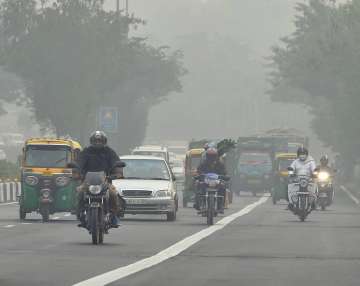Dense smog continues to choke Delhi-NCR; eight trains cancelled, 21 rescheduled
Dense smog continued to cover Delhi-NCR for the sixth day today, leaving people gasping for breath during the morning hours.

Dense smog continued to hover over Delhi and the National Capital Region for the sixth day today, leaving people gasping for breath during the morning hours. People on morning walks complained of breathing problems, urging the government to fix the situation at the earliest.
At 10:30 am on Sunday morning, the PM10 levels in Delhi's Lodhi Road area reached 560 and the PM2.5 was at 625, Centre-run air monitoring agency SAFAR (System of Air Quality and Weather Forecasting & Research) data said. At all monitoring stations in Delhi and Noida, the air quality index (AQI) fell under "severe" category with the highest being recorded at Delhi University.
Railway officials in Delhi said that 21 trains have been rescheduled, eight have been cancelled and 34 are running late due to smog in North India.
Trucks and other heavy vehicles were barred from entering into Delhi last night in view of high levels of air pollution. Huge rows of heavy vehicles were seen on the roads leading to Delhi.
The air quality has forced a US-based airlines to temporarily suspend flights to Delhi due to "poor air quality" in the national capital.
"United temporarily suspended Newark-Delhi flights due to poor air quality concerns in Delhi and currently has waiver policies in place for customers who are travelling to, from or through Delhi," United Airlines spokesperson said in a statement on Saturday.
The spokesperson also said the airline is monitoring advisories as the region remains under a public health emergency, and is coordinating with respective government agencies.
United Airlines customers have been asked to check its website or download the mobile app for latest updates. The carrier operates flights to Newark from Delhi and Mumbai.
Delhi's air quality entered the 'emergency' category on Saturday evening, dashing hopes of recovery generated during the morning hours when level of pollutants showed a steady drop.
The dramatic reversal in the situation, hours after the government announced that levels of ultrafine particulates PM2.5 and PM10 had seen a reduction, caught people and weather scientists unaware.
Centre-run air monitoring agency SAFAR's project director Gufran Beig told PTI that the sharp drop of the boundary layer where pollutants remained trapped for being unable to escape into the upper layer of the atmosphere.
The CPCB's air quality index for the day (based on pollution levels till 5 pm) had a score of 403, as against Friday's 468.
The concentration of PM2.5 and PM10 hovered around 490 and 290 micrograms per cubic metre during the morning hours, marginally below the emergency limit of 500 and 300.
But by 6 pm the readings had changed to 522 and 332. In fact, the gains made started diminishing from around 2 pm itself.
Meanwhile, the Delhi government on Saturday its odd-even scheme, which was to come into effect on Monday, expressing its inability to enforce the measure after the National Green Tribunal ordered the withdrawal of exemptions given to women and two-wheelers.
A choking blanket of smog enveloped the national capital this week, prompting authorities to announce the Odd-Even policy from November 13 for five days, closure of schools till Sunday and a four-fold hike in parking fee for vehicles.
The odd-even policy mandates private vehicles to ply on the basis of the last digit on their number plates - odd-numbered cars on odd dates and even-numbered cars on even dates.
The move was, however, deferred by the government after a meeting chaired by Chief Minister Arvind Kejriwal.
Announcing the move to hold off the implememtsation, Transport Minister Kailash Gahlot announced that the measure, which was to be implemented between November 13 and 17, was being "called off" as the number of buses were inadequate and women's safety could not be compromised.
The government said it will move the NGT on Monday requesting a review of its order and if the exemptions are granted, the scheme's implementation "will be considered".
Gahlot said the authorities are ready to roll it out immediately if the exemptions are granted.
The NGT, which gave a conditional nod to the scheme, said that it should be implemented as and when PM (particulate matter) 10 level goes above 500 micrograms per cubic metre and PM 2.5 level crosses the limit of 300 micrograms per cubic metre and persist for 48 hours at a stretch.
(With agencies)